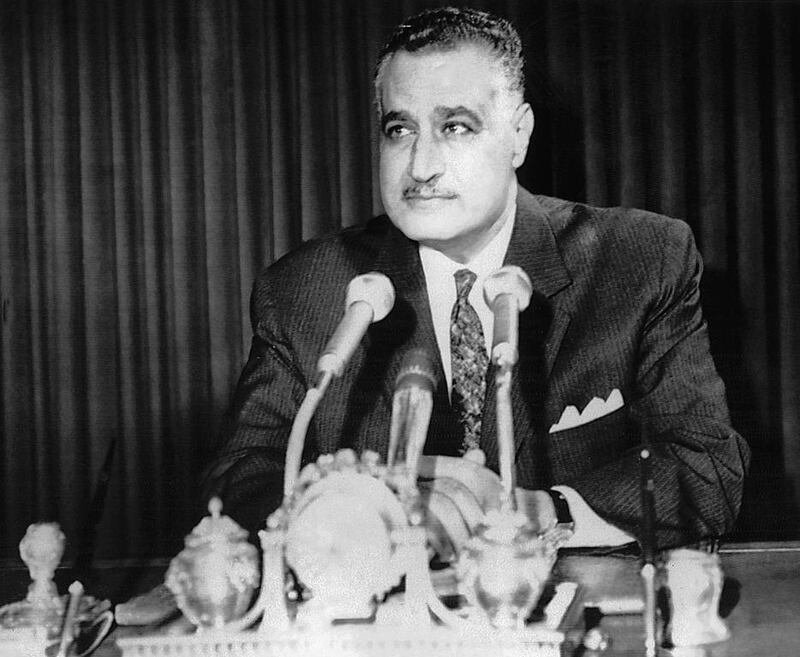Gamal Abdel Nasser, it is often said, was the John F Kennedy of the Arabs. That’s not necessarily meant as a compliment: both, supporters say, were youthful, charismatic and taken too soon. Yet both valued style over substance.
Kennedy embodied the arrival of the television age in American politics, and Nasser did the same in the Arab world. Best remembered for his powerful speeches on the radio, Nasser was also the first Arab leader to speak to the West, on television, in their own language.
He also, indirectly, began the modern age of Middle East lobbying. It was the Suez crisis of 1956 that exposed the divisions within the West over the Middle East, with the United States ultimately siding with the Egyptians and forcing a British and French withdrawal.
That, in turn, spooked the Israelis, who feared both the rise of Arab nationalism and the possibility that the US, then emerging as a power in the region to replace the British, might side decisively with the Arabs.
In the decades since, Israel has poured millions of dollars into lobbying Western governments, drawing on the support of Jewish communities in the West. Arab governments, too, have lobbied the West, although with less engagement with Arab communities settled there. At the same time, the United States has pivoted its policy in the Middle East firmly towards Israel, leading many observers to link the two, and believe that the so-called “Israel lobby” was the decisive factor.
How best to lobby the West has been a recurring theme in Arab diplomacy for some time. A few years ago, I edited the largest-ever survey of British-Arabs for the Atlantic Forum, a UK think tank. Since then, I've spoken on the topic of political lobbying in London, Berlin and Beirut, particularly about how Arab governments can better speak to Western audiences. I usually say that the Arabs already have immense power in the West; they just don't know it.
It is not true that Arab states have no influence in the corridors of Western power – precisely the opposite, in fact. Washington, London, Paris, Berlin, and others, listen carefully when powerful Arab countries, such as Egypt, Saudi Arabia or the UAE, speak.
What is true, however, is that Arab communities in the West don’t hold that same power.
In fact, Arabs in the West are curiously disconnected from politics – perhaps because of the political turmoil that often precipitated their departure from their home countries. As the journalist Hisham Melhem put it at an Al Arabiya event in Dubai last week to discuss how Arabs can be more effective at lobbying the West: “If the Arabs are not effective in their own societies, they are not going to be effective overseas.”
When it comes to Arabs lobbying the West, it is possible to distinguish three strands. There’s the lobbying of Arab communities in the West of their own governments for issues that are relevant to them – it is telling, for example, that in the British-Arab survey, the most vital issues were to do with education, health and the economy. In other words, bread and butter politics.
Then there’s the lobbying of Arab governments for their own issues, which is often conducted behind closed doors.
And then there’s the lobbying of Arab governments as a whole. The Saudi analyst Abdullah Hamidaddin has suggested that the Arab world is simply too vast, too disparate for a single lobby. That’s true to an extent. Lobbying is most effective when there is a clear issue, agreement on that issue, and grassroots movements committed enough to spend time, money and effort on that issue.
Is there any one political issue in the Arab world today that meets those criteria? The occupation of Palestine would seem to be the most likely – and yet Palestinians in Gaza and the West Bank can’t agree, to say nothing of the Palestinian diaspora, or other Arabs.
Yet there are issues on which, theoretically, the Arab world could speak with a single voice – issues of preferential trade deals, for example. And there are issues that could unite these three types of lobbying. The Syrian civil war, for example, might unite parts of all three groups: Syrian-Americans might link up with the Lebanese government and with the Arab League to call for greater US intervention.
Lobbying, for the Arabs, is vastly more complex than it is for a single country, such as Israel, with which the lobbying efforts of the Arabs is often contrasted. That complexity is why Arab governments have struggled to motivate their bases in the West. And it is why there is a fundamental mismatch between the needs of Western governments – which often want clear political lines on vastly complex countries – and Arab governments, who have struggled to define a coherent vision for the future of the region.
Indeed, I would flip the direction of lobbying around. I’ve long argued, for example, that Arab communities need to raise their profile in their respective countries – but not on Arab issues, on bread and butter political issues. The more the Arabs in Britain or the US lobby their politicians on issues such as roads and schools, the more familiar they will be with the political process, and the more politicians will, in turn, seek their input on issues further afield. At the same time, Arab governments should speak not merely to Western governments, but to Western Arabs. Because while Arabs in the West can be a bridge to the Arab world, they are also, first and foremost, citizens of various Western countries. If Arab governments could see them as allies to be gained, rather than supporters to be taken for granted, there might be more grassroots support. In that regard, the real future for the lobbying of Arab governments in the West is for them to first lobby the Arabs.
falyafai@thenational.ae
On Twitter: @FaisalAlYafai






